联合国文件翻译课件
联合国文件翻译修改 版
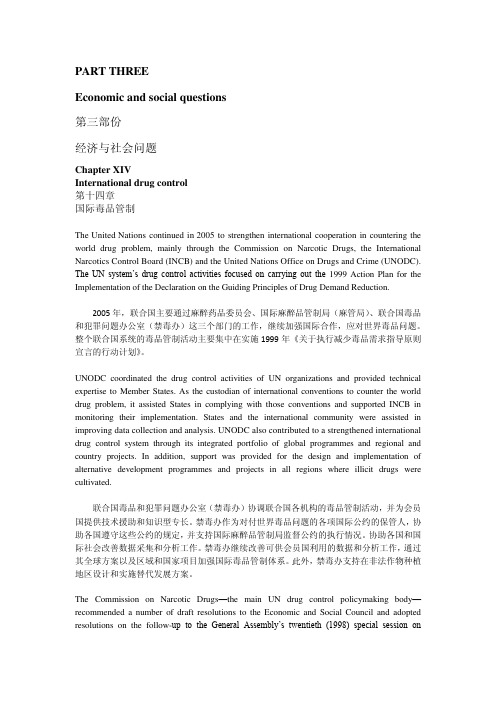
PART THREEEconomic and social questions第三部份经济与社会问题Chapter XIVInternational drug control第十四章国际毒品管制The United Nations continued in 2005 to strengthen international cooperation in countering the world drug problem, mainly through the Commission on Narcotic Drugs, the International Narcotics Control Board (INCB) and the United Nations Office on Drugs and Crime (UNODC). The UN system’s drug control activities focused on carrying out the 1999 Action Plan for the Implementation of the Declaration on the Guiding Principles of Drug Demand Reduction.2005年,联合国主要通过麻醉药品委员会、国际麻醉品管制局(麻管局)、联合国毒品和犯罪问题办公室(禁毒办)这三个部门的工作,继续加强国际合作,应对世界毒品问题。
整个联合国系统的毒品管制活动主要集中在实施1999年《关于执行减少毒品需求指导原则宣言的行动计划》。
UNODC coordinated the drug control activities of UN organizations and provided technical expertise to Member States. As the custodian of international conventions to counter the world drug problem, it assisted States in complying with those conventions and supported INCB in monitoring their implementation. States and the international community were assisted in improving data collection and analysis. UNODC also contributed to a strengthened international drug control system through its integrated portfolio of global programmes and regional and country projects. In addition, support was provided for the design and implementation of alternative development programmes and projects in all regions where illicit drugs were cultivated.联合国毒品和犯罪问题办公室(禁毒办)协调联合国各机构的毒品管制活动,并为会员国提供技术援助和知识型专长。
岳麓版《联合国》ppt实用课件

解决贸易争端
6.经济全球化的影响
经济全球化是把双刃剑
积极方面:
1、全球化推动了国际经済交流与合作,让国家间经済往来障 得减少,对发展中国家也是机遇;
2、全球化能够让发展中国家吸引更多的国外技术和投資,增 加出口和就业;
联合国维和部队
联合国的维和行动:据统计,自1948年首次向中东地 区派出监督阿以战争停火的部队以来,联合国共执行 了60多次规模较大的维和行动,投入资金超过400亿美 元;有100万名官兵、警官和文职人员在联合国旗帜下 履行过维和使命,还有2000余人为此献出了生命。
二、经济全球化与世界贸易组织
3自、主学联习合·国梳理职新权知 和则集中表现在五个常任理事国的“否决权”上。
联合国的职权: 表现2、跨国公司影响增大,扮演重要的角色
联合国主要机构-安理会机制
根据安理会或联大的决议,联合国可以向冲突地区 联合国大会简称“联大”)
此案成为中国在世贸组织起诉欧盟的第一案。 表现2、跨国公司影响增大,扮演重要的角色
2、联合国主要机构
联合国的主要机构
联合国大会简称“联大”)
托管理事会
安全理事会(简称“安理会”)
国际法院
秘书处
经济及社会理事会
联合国主要机构-联大
联 ③进行国际合作,以解决国际间经济、社会、文化和人道主义性质的问题,并且促进对于全体人类的人权和基本自由的尊重。 合 克隆猴诞生,第三次科技革命突破
②第三次科技革命 以来现代高新科技 发展迅猛,生产力 得到迅速提高;
③国家之间的经济 联系日益紧密。
苏联解体
柏林墙倒塌
模拟联合国文件写作培训PPT
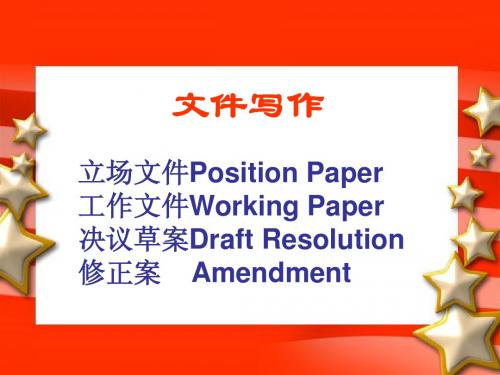
二、工作文件 Working Paper 当一国或国家集团对议题产生初步 的解决办法时, 的解决办法时,可以总结成一份工 作文件,提交给大会, 作文件,提交给大会,向各国介绍 己方的解决办法。 己方的解决办法。工作文件不需要 特定的文件格式,可以是图表, 特定的文件格式,可以是图表,可 以是文段,也可以列关键点。 以是文段,也可以列关键点。也可 以将工作文件作为决议草案的雏形, 以将工作文件作为决议草案的雏形, 按照决议草案的格式撰写, 按照决议草案的格式撰写,具有全 面性。 面性。
2、友好修正案 可以由任何国家提出 由所有起草国同意并签署的修改 主席团批准后,自动录入该草案中, 主席团批准后,自动录入该草案中,无需投 票 3、非友好修正案 由任何国家提出的修改 遭部分或所有起草国的反对 必须获得20%国家的签署同意才能呈交给主席 必须获得20%国家的签署同意才能呈交给主席 团 批准后,需经过动议来引入议程,并以2/3多 批准后,需经过动议来引入议程,并以2/3多 数通过
• 1、何为决议草案? 、何为决议草案? • 工作文件格式和内容 上的加工和完善 • 需要投票,所以为 需要投票, 草案” “草案” • 投票通过即成为正式 决议
2、决议草案的形成 综合各方和WP的观点 综合各方和WP的观点 起草:起草国(sponsors) 起草:起草国(sponsors) 一国或多国 起草国不能起草或附议其他DR 起草国不能起草或附议其他DR 寻求附议:附议国(signatories) 寻求附议:附议国(signatories) 并不意味着支持或反对, 并不意味着支持或反对,而是认为值得讨论 起草国不能成为附议国 一国可成为多个草案的附议国 提交主席团审核 主席通过、 主席通过、编号并印发全场 动议介绍 起草国解释草案的主要内容和意义,时限3 起草国解释草案的主要内容和意义,时限3分钟 其他代表提问(针对草案语法的3个问题) 其他代表提问(针对草案语法的3个问题) 回到发言名单 动议磋商
联合国文件翻译课件
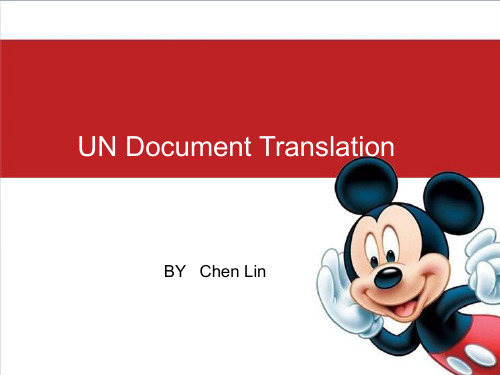
• 定稿译文: • 在二战结束后的1945年,世界各国首脑聚集旧金 山,旨在建立一个全球性组织以维护世界和平, 促进国与国之间的合作。同年,联合国在旧金山 成立,并通过了其指导性文件《联合国宪章》, 要求所有成员国承诺“不分种族、性别、语言和 宗教,推动对人权和基本自由的普遍尊重和遵守 ”。 •
• 两段译文,我们可以看一看初译和改译的区别 • 初译中我们很明显的看到有两个时间状语,1945 年和第二次世界大战结束以后。然后,再往下, 旨在建立一个.......组织,中间有着很长的定语, 在座的各位读读看,恐怕也有点累吧?第三,原 译中有“联合国在那里成立”,好,且不说那里 是指哪里。但这一句明显是承前启后的,译为“ 那里成立”,就显得很突兀了, 前面一句到底主 要说了是联合国成立的背景还是成立的地点?最 后,再来看,所有成员和无一例外,两者明显是 重复了,显得比较啰嗦。
什么是联合国文件翻译? 联合国文件翻译,顾名思义,就是对联合国各类 书面文献的翻译。当然,在这里,不仅仅指翻译 活动本身,更是指翻译联合国文件的整体工程。 联合国文件的翻译是一项长期的、综合性的翻译 工程,参与者不仅有我们的老师,也有同学,我 们,以前我们的学长,不久之后,还有在坐的各 位。我们所说的联合国文件的翻译,更多的便是 指这一项工程。
• 把这两个译文相比较,是想告诉大家,怎样的语 言才是规范、完整的,才是明白畅晓、简洁准确 的。我希望,这样一个对比,能对大家今后的翻 译和修改工作有一点启发吧。
• 2统一的问题。由于翻译的文件篇幅往往比较长, 许多术语、短语等会反复多次在文件的不同部分 出现。为确保译文的规范性,我们很有必要对这 些术语、短语等进行统一,这是联合国文件翻译 的基本要求。当然,统一其实并不仅仅指术语和 短语,还包括格式,甚至字号、字体、颜色等细 微之处。
联大2758号决议原文及译文

联大2758号决议原文及译文摘要:1.联大2758 号决议的背景和重要性2.决议的内容概述3.决议的具体内容和意义4.决议的影响和后果5.总结正文:联大2758 号决议原文及译文,是关于恢复中华人民共和国在联合国组织中的合法权利问题的决议。
该决议于1971 年10 月25 日联合国大会第26 届会议上进行表决通过,是中华人民共和国在国际舞台上的重要历史事件。
决议的内容概述:大会回顾联合国宪章的原则,认为恢复中华人民共和国的合法权利对于维护联合国宪章和联合国组织根据宪章所必须从事的事业都是必不可少的。
承认中华人民共和国政府的代表是中国在联合国组织的唯一合法代表,中华人民共和国是安全理事会五个常任理事国之一。
决定恢复中华人民共和国的一切权利,承认她的政府的代表为中国在联合国组织的唯一合法代表,并立即把蒋介石的代表从它在联合国组织及其所属一切机构中所非法占据的席位上驱逐出去。
决议的具体内容和意义:联大2758 号决议是联合国大会表决通过的一项具有历史意义的决议。
它确认了中华人民共和国在联合国的合法地位,并明确规定中华人民共和国政府是唯一合法的中国代表。
这一决议的通过,标志着中华人民共和国在国际事务中的地位得到了充分的肯定和认可,对于中国在国际事务中发挥更大的作用具有重要的意义。
同时,该决议的通过也意味着蒋介石的代表被驱逐出联合国,中国台湾地区不再拥有在联合国的席位。
决议的影响和后果:联大2758 号决议的通过,不仅使中华人民共和国在联合国的合法地位得到确认,而且对于中国在国际事务中的地位和作用的提升产生了深远的影响。
此后,中华人民共和国开始在联合国及其所属机构中发挥越来越重要的作用,参与了许多重要的国际事务和决策,为维护世界和平、促进国际发展做出了积极的贡献。
同时,该决议的通过也为中国与世界各国建立和发展外交关系提供了重要的法律依据和政治保障。
总结:联大2758 号决议原文及译文,是关于恢复中华人民共和国在联合国组织中的合法权利问题的决议。
联合国PPT
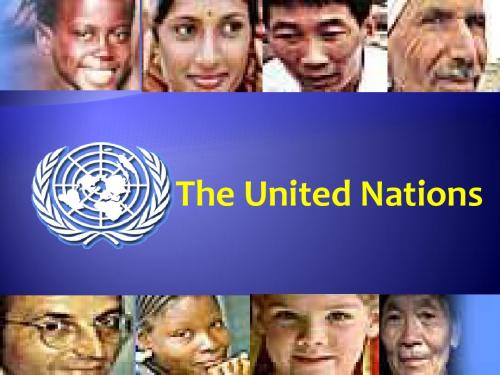
经社理事会由54个理事国组成,经大会选举产生,任期三年。 经济及社会理事会一般每年举行一次为期五至六个周的实质性会议, 地点在纽约和日内瓦之间交替,并在纽约举行一次组织会议。实质性会 议包括一次由部长及其他高级官员出席的高级别特别会议,讨论重大的 经济和社会问题。
the Trusteeship Council
the Secretariat
The Secretariat is the administrative secretary affairs agency of the United Nations agencies. The secretary general is the chief administrative officer of the United Nations, recommended by the Security Council, appointed by the general assembly, elected for a term of 5 years, responsible for major international political responsibility. Since the founding of the United Nations, the Secretary General has 8, the current secretary general is South Korea's Ban Ki-moon, he was in 2007 January inauguration.
The Security Council (the Council), by law, have 5 permanent members and 10 non permanent members, is the only institution has the right to take action to maintain international peace and security. The Security Council on issues of international mediation and implement the 5 permanent members of the principle of consistency (great powers agreed principles, namely) every decision as long as there is a permanent member of the UN Security Council veto, can not pass. 安全理事会(简称安理会)由中、法、苏(现由俄罗斯联邦继任)、英、 美5个常任理事国和10个非常任理事国组成,是唯一有权采取行动维护国际 和平与安全的机构。 安理会对国际问题的调停和裁决实行5个常任理事国一致的原则(大国 一致原则),即每项决议只要有一个常任理事国投否决票,便不能通过。
【国际组织全说(二)】联合国翻译及秘书长
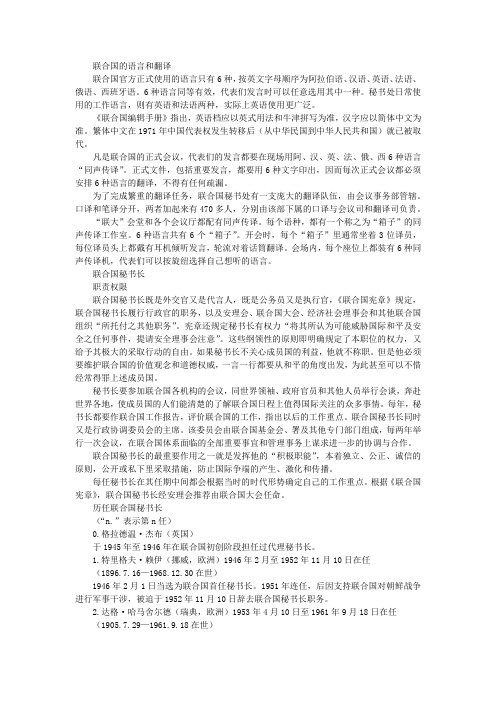
联合国的语言和翻译联合国官方正式使用的语言只有6种,按英文字母顺序为阿拉伯语、汉语、英语、法语、俄语、西班牙语。
6种语言同等有效,代表们发言时可以任意选用其中一种。
秘书处日常使用的工作语言,则有英语和法语两种,实际上英语使用更广泛。
《联合国编辑手册》指出,英语档应以英式用法和牛津拼写为准,汉字应以简体中文为准。
繁体中文在1971年中国代表权发生转移后(从中华民国到中华人民共和国)就已被取代。
凡是联合国的正式会议,代表们的发言都要在现场用阿、汉、英、法、俄、西6种语言“同声传译”。
正式文件,包括重要发言,都要用6种文字印出,因而每次正式会议都必须安排6种语言的翻译,不得有任何疏漏。
为了完成繁重的翻译任务,联合国秘书处有一支庞大的翻译队伍,由会议事务部管辖。
口译和笔译分开,两者加起来有470多人,分别由该部下属的口译与会议司和翻译司负责。
“联大”会堂和各个会议厅都配有同声传译。
每个语种,都有一个称之为“箱子”的同声传译工作室。
6种语言共有6个“箱子”。
开会时,每个“箱子”里通常坐着3位译员,每位译员头上都戴有耳机倾听发言,轮流对着话筒翻译。
会场内,每个座位上都装有6种同声传译机,代表们可以按旋纽选择自己想听的语言。
联合国秘书长职责权限联合国秘书长既是外交官又是代言人,既是公务员又是执行官,《联合国宪章》规定,联合国秘书长履行行政官的职务,以及安理会、联合国大会、经济社会理事会和其他联合国组织“所托付之其他职务”。
宪章还规定秘书长有权力“将其所认为可能威胁国际和平及安全之任何事件,提请安全理事会注意”。
这些纲领性的原则即明确规定了本职位的权力,又给予其极大的采取行动的自由。
如果秘书长不关心成员国的利益,他就不称职。
但是他必须要维护联合国的价值观念和道德权威,一言一行都要从和平的角度出发,为此甚至可以不惜经常得罪上述成员国。
秘书长要参加联合国各机构的会议,同世界领袖、政府官员和其他人员举行会谈,奔赴世界各地,使成员国的人们能清楚的了解联合国日程上值得国际关注的众多事情。
联合国翻译
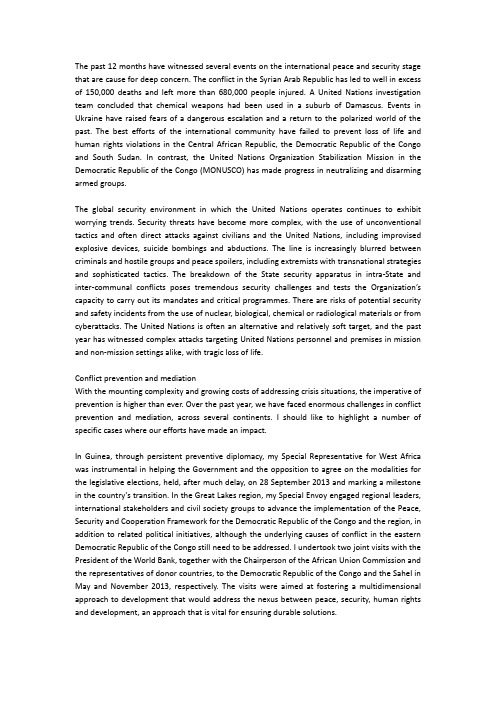
The past 12 months have witnessed several events on the international peace and security stage that are cause for deep concern. The conflict in the Syrian Arab Republic has led to well in excess of 150,000 deaths and left more than 680,000 people injured. A United Nations investigation team concluded that chemical weapons had been used in a suburb of Damascus. Events in Ukraine have raised fears of a dangerous escalation and a return to the polarized world of the past. The best efforts of the international community have failed to prevent loss of life and human rights violations in the Central African Republic, the Democratic Republic of the Congo and South Sudan. In contrast, the United Nations Organization Stabilization Mission in the Democratic Republic of the Congo (MONUSCO) has made progress in neutralizing and disarming armed groups.The global security environment in which the United Nations operates continues to exhibit worrying trends. Security threats have become more complex, with the use of unconventional tactics and often direct attacks against civilians and the United Nations, including improvised explosive devices, suicide bombings and abductions. The line is increasingly blurred between criminals and hostile groups and peace spoilers, including extremists with transnational strategies and sophisticated tactics. The breakdown of the State security apparatus in intra-State and inter-communal conflicts poses tremendous security challenges and tests the Organization’s capacity to carry out its mandates and critical programmes. There are risks of potential security and safety incidents from the use of nuclear, biological, chemical or radiological materials or from cyberattacks. The United Nations is often an alternative and relatively soft target, and the past year has witnessed complex attacks targeting United Nations personnel and premises in mission and non-mission settings alike, with tragic loss of life.Conflict prevention and mediationWith the mounting complexity and growing costs of addressing crisis situations, the imperative of prevention is higher than ever. Over the past year, we have faced enormous challenges in conflict prevention and mediation, across several continents. I should like to highlight a number of specific cases where our efforts have made an impact.In Guinea, through persistent preventive diplomacy, my Special Representative for West Africa was instrumental in helping the Government and the opposition to agree on the modalities for the legislative elections, held, after much delay, on 28 September 2013 and marking a milestone in the country’s transition. In the Great Lakes region, my Special Envoy engaged regional leaders, international stakeholders and civil society groups to advance the implementation of the Peace, Security and Cooperation Framework for the Democratic Republic of the Congo and the region, in addition to related political initiatives, although the underlying causes of conflict in the eastern Democratic Republic of the Congo still need to be addressed. I undertook two joint visits with the President of the World Bank, together with the Chairperson of the African Union Commission and the representatives of donor countries, to the Democratic Republic of the Congo and the Sahel in May and November 2013, respectively. The visits were aimed at fostering a multidimensional approach to development that would address the nexus between peace, security, human rights and development, an approach that is vital for ensuring durable solutions.In Somalia, the establishment of a new political mission in Mogadishu for the first time since 1995 was an important milestone. Complex challenges remain. My Special Representative continues to support the Government and other actors in the country through his good offices. His role in support of a peaceful indirect election in Puntland in January 2014 has been widely acknowledged.My Special Adviser on Yemen, working closely with the Gulf Cooperation Council and the Security Council, facilitated the successful conclusion of the National Dialogue Conference in January 2014. To mobilize support for the stability of Lebanon against the impact of the Syrian conflict, I established an international support group in September 2013. We also continued to support the efforts of the Lebanese authorities to preserve security and unity, including through the formation of a government of national interest. The recent deterioration notwithstanding, United Nations support to the Israeli-Palestinian peace process remains a priority, with the goal of establishing a peaceful settlement and a two-State solution.In Myanmar, the progress made in strengthening democratic and human rights institutions, inclusive socioeconomic development and peace efforts between the Government and various armed ethnic groups is at risk of being undermined by growing communal tensions and religious strife. Our good offices effort will need to be sustained in order to continue to tackle those issues, in addition to constitutional reform, national reconciliation and other challenges emerging at this critical juncture.In our conflict prevention and mediation work, we continue to face challenges regarding how best to engage with sometimes amorphous movements or fractured armed groups and how to ensure inclusivity. There is increasing interest in national dialogues as a tool, Yemen being an example. Consultation with women’s groups is also one of my priorities and has been conducted in six of our processes over the past year (Georgia, Mali, Sudan (Darfur), Syrian Arab Republic, Yemen and Western Sahara). High-level gender expertise has been systematically provided to most peace and security processes.We have been able to better respond to increasing demands from Member States to support national actors in their conflict prevention and mediation efforts. In South America, where peace talks between the Government of Colombia and the Fuerzas Armadas Revolucionarias de Colombia were launched in August 2012, the United Nations has supported the contribution of civil society through dialogue mechanisms.Experience over the past year has also highlighted the important role of regional and subregional organizations, with which we have strengthened our relationships. Our regional offices in West Africa, Central Africa and Central Asia have played a significant role in fostering conflict prevention and mediation partnerships, in addition to rapid responses to regional crises.There are also, however, several tragic cases where we have not been successful. While our joint efforts with the League of Arab States to put an end to the violence in the Syrian Arab Republic succeeded in bringing the sides together in two rounds of talks in Geneva, unfortunately the talkshave yielded little. More than 150,000 people, including over 10,000 children, have been killed in the Syrian Arab Republic since March 2011. A further 6.5 million are internally displaced and 2.8 million are seeking refuge in other countries, notably Egypt, Iraq, Jordan, Lebanon and Turkey. In the unfolding tragedy of the Central African Republic, the United Nations has been assisting the Economic Community of Central African States, its mediator and the African Union in endeavouring to resolve the crisis. Thousands of people have been killed since March 2013 when the Séléka rebel coalition ousted the President, François Bozizé. At the time of preparation of the present report, more than 625,000 people had been displaced throughout the country. While our immediate priority is to stop the violence, we are working to facilitate a political process, with particular attention to the need for reconc iliation. During the period under review, conflict-related sexual violence remained underreported but prevalent in settings such as the Central African Republic, Côte d’Ivoire, the Democratic Republic of the Congo, Libya, Somalia, South Sudan and the Syrian Arab Republic. The continued political will to prevent this scourge was exemplified by the Declaration of Commitment to End Sexual Violence in Conflict, launched on the sidelines of the sixty-eighth session of the General Assembly, and the subsequent Global Summit to End Sexual Violence in Conflict, held in London in June 2014. To translate political will into specific action, my Special Representative on Sexual Violence in Conflict has continued to engage with national authorities at the highest level.The adoption of Security Council resolution 2122 (2013), general recommendation No. 30 of the Committee on the Elimination of Discrimination against Women and the declaration of the Peacebuil ding Commission on women’s economic empowerment for peacebuilding represent significant steps in advancing the women and peace and security agenda more broadly.The Security Council has called for sustained monitoring and reporting on the violations affecting children in armed conflict and for perpetrators to be brought to account. In March 2014, my Special Representative for Children and Armed Conflict and the United Nations Children’s Fund launched the global campaign “Children, Not Soldiers”, which is a imed at ending and preventing the recruitment and use of children by all national security forces in conflict by 2016.Democratic transitions and electionsCountries undergoing or seeking to consolidate democratic transition continue to benefit from inclusive, participatory, transparent and nationally owned constitutional reform. The implementation of a new constitution can take years and sometimes decades of commitment for the goals of democracy, good governance and the rule of law to be realized and enjoyed. The past 12 months have seen an increase in constitutional reform processes and requests from Member States for the United Nations to provide constitutional support, with peace operations and/or country teams providing assistance to more than a dozen Member States during the period under review. The United Nations country team continued to support reform efforts in Tunisia, where, setbacks notwithstanding, commitments to inclusive dialogue and consensus-building resulted in a more legitimate and nationally owned constitution and the foundation for stability and democratic governance, which is expected to culminate in elections in 2015.Member States have continued to see the value of United Nations support to electoral processes, with requests for assistance —which include technical assistance, the engagement of good offices and support to regional organizations —remaining high. For example, while technical assistance was provided to Afghanistan in the context of the presidential election held in 2014, my Special Representative also supported broad consultations on the legal framework and on the appointment of electoral commissioners. In Nepal, the Organization continued to provide technical support to the electoral commission and supported efforts to ensure that the political commitments of all relevant actors regarding the Constituent Assembly election held in November 2013 were met. A similar approach was taken in Guinea-Bissau. In Madagascar, the United Nations provided assistance to the electoral commission and worked with the Southern African Development Community and the African Union to enable peaceful elections in 2013 and the end of the transition process in 2014.Electoral assistance has been provided in challenging security environments, many under Security Council mandates. In Mali, the Organization supported the conduct of the 2013 presidential and legislative elections that ended the transition process. The United Nations Assistance Mission in Iraq supported the electoral commission with the legislative elections in 2014, in spite of the difficult operating environment. The United Nations Support Mission in Libya supported the elections for the Constitutional Drafting Assembly and Council of Representatives, held in February and June 2014, respectively, as part of the post-conflict transition process. Further to a Security Council mandate and a request from the Transitional Government, the United Nations is providing support in the Central African Republic for the preparation and conduct of a referendum on the Constitution, in addition to presidential and legislative elections.Civil society organizations around the world have continued to demand to participate in transitions, governance and elections. That was reflected in the work of the United Nations Democracy Fund, which received more than 2,000 project proposals from organizations in over 130 countries during its annual proposal window. They included wide-ranging proposals from countries in transition, including Libya and Tunisia, where civil society had previously been almost non-existent or under severe government control. At the same time, a growing number of Governments have proposed national legislation restricting the freedom of civil society groups to operate, including with regard to international funding.PeacekeepingMember States have demonstrated their continued interest in using peacekeeping and continued to recognize it as an effective and cost-effective tool, without which the human and material costs of conflict and relapse into conflict would be unquestionably higher. Although the environments for United Nations peacekeeping operations have always been challenging, we face today a heightened level and new types of security threat, requiring new approaches and strategies. Peacekeeping operations are being increasingly deployed earlier in the conflict continuum, before any peace or ceasefire agreement. Creating the political and security space necessary for successful negotiations is crucial. The lessons of early deployment contexts need to be better analysed and recognized.Achievements in the period under review included the establishment and deployment of the United Nations Multidimensional Integrated Stabilization Mission in Mali, promoting reconciliation and political dialogue, including with armed groups, and the stabilization of the security situation, in particular in the north of the country, which remains volatile. In the Democratic Republic of the Congo, MONUSCO addressed the crisis in the east, including by supporting the Peace and Security Framework and the deployment of the Force Intervention Brigade. In addition, the United Nations Stabilization Mission in Haiti facilitated constructive political dialogue, including on long-awaited legislative and local elections. We also supported the planning and deployment of the African-led International Support Mission in the Central African Republic and its transformation into a United Nations peacekeeping operation as the United Nations Multidimensional Integrated Stabilization Mission in the Central African Republic.South Sudan has been gripped by violence and ethnic strife since mid-December 2013. While the United Nations Mission in South Sudan is protecting tens of thousands of civilians in its bases throughout the country, a political agreement between the parties is needed to halt the descent into a worsening spiral of violence and is vital to alleviating the plight of civilians. In the Golan, the United Nations Disengagement Observer Force has continued to operate under extremely challenging conditions amid the continuing armed conflict in the Syrian Arab Republic. Together with the United Nations Interim Force in Lebanon and the United Nations Truce Supervision Organization, it has contributed to containing the crisis. The United Nations Mission in Liberia has contributed to improving security throughout the country, but there are concerns about the future as it draws down. There are similar concerns in Côte d’Ivoire in view of the elections scheduled for October 2015 and the gradual drawdown of the United Nations mission. The African Union-United Nations Hybrid Operation in Darfur has made important strides towards promoting peace and stability, but shortfalls in troop- and police-contingent capabilities and the need for improved coordination and integration structures within the mission remain challenges to the effective implementation of the mandate.Financial and capability constraints have a significant impact on our ability to deliver. The cost of peacekeeping, per capita, has been reduced by 15 per cent compared with four years ago. The United Nations continues to seek greater efficiency while increasing the effectiveness of its field missions. Human and material resources are limited, yet host populations and the international community expect us to protect civilians and implement varied and complex peacekeeping and early peacebuilding mandates. Fully meeting those expectations is a challenge.The field support requirements for our field missions continue to grow, with demand for more flexible, mobile and nimble operations able to deploy swiftly into increasingly inhospitable settings. In South Sudan, enhanced mobility and standby arrangements would have greatly assisted in the rapid strengthening of the mission when the crisis erupted. In Darfur, the African Union-United Nations Hybrid Operation continues to operate across vast spaces and difficult terrain to protect civilians and facilitate humanitarian assistance, in spite of the increased number of attacks against peacekeepers. Ensuring that United Nations troops are properly supported and equipped is a high priority. We are striving to achieve the greatest possible impact on the ground with the resources that we are given, advancing our field support efforts throughthe global field support strategy.Supporting missions in the field will require an exploration of technological and other advances to improve effectiveness, increase efficiency and minimize the environmental footprint of field operations. Incorporating solutions offered by new technologies and other innovations remains a priority. The complexity of contemporary peacekeeping environments requires strengthened partnerships with all stakeholders, including regional and subregional organizations, the wider United Nations family, international and regional financial institutions and donors, and multilateral and bilateral partners. Only through such collaboration can we collectively address the challenges that we face.To be truly effective, United Nations peacekeeping requires the highest political engagement and support from the international community and host Governments. In the Democratic Republic of the Congo, a coordinated political strategy in the form of the Peace and Security Framework has been vital in underpinning the efforts of MONUSCO to neutralize and disarm armed groups. The consent of the host Government, the support of host communities, the active involvement of all key parties, the inclusion of women in peace processes, the strong political engagement of key Member States and the provision of the resources and authority required for the Secretariat to deliver the mandates provided have all been critical, as have the political will and support of the Security Council and police- and troop-contributing countries.PeacebuildingThe past year saw an important milestone in the emergence of Sierra Leone from conflict, with the closure of the United Nations Integrated Peacebuilding Office in that country in March 2014 and the transfer of res ponsibility for the Organization’s continued support to the United Nations country team. Peacebuilding remains an unpredictable enterprise, however, with the constant risk of relapse, as demonstrated by the re-eruption of violent conflict in the Central African Republic and South Sudan, in addition to political tensions in Guinea and a challenging road towards the restoration of constitutional order in Guinea-Bissau.The Peacebuilding Commission brought to bear the collective weight of Member States in support of peacebuilding processes in six countries. In Sierra Leone, the Commission accompanied the country through the transition. With the assistance of the Peacebuilding Support Office, Member States also continued to provide political support to United Nations officials and mandates in Burundi and Liberia. My Special Representatives also benefited from the support, in difficult circumstances, of the Peacebuilding Commission in the Central African Republic, Guinea and Guinea-Bissau, which helped to reinforce their political messages and efforts to mobilize international and regional supportThe Peacebuilding Fund also played a critical role, allocating $86.7 million, a significant increase over the amount in 2012, to support peaceful transitions in 14 post-conflict countries in 2013. The Fund supported United Nations responses to the relapse into violence in the Central African Republic and Guinea -Bissau. In Guinea and Yemen, it supported critical mediation efforts and national dialogues. Elsewhere, in Burundi, Kyrgyzstan, Liberia and Sierra Leone, the Fundprovided assistance in the areas of decentralization, justice, human rights and the participation of women in politics.。
- 1、下载文档前请自行甄别文档内容的完整性,平台不提供额外的编辑、内容补充、找答案等附加服务。
- 2、"仅部分预览"的文档,不可在线预览部分如存在完整性等问题,可反馈申请退款(可完整预览的文档不适用该条件!)。
- 3、如文档侵犯您的权益,请联系客服反馈,我们会尽快为您处理(人工客服工作时间:9:00-18:30)。
工作的流程
• 联合国文件翻译工作的流程: • 粗略来分的话,主要分一下四部分:
文件的传达和分发
文件的翻译
定稿
译文的修改
• 细分一下的话,又可以分为两条线 • Line 1 and Line 2. 顺序是From Line 1 to Line 2 • 下面我们看看具体的图
Line 1
联合国
外国语学院
• 例2 • 原文:Reduces the amount of money the government has available to pay workers and buy supplies, such as books, medicine and computers. • 译文 1 降低政府能付给工人、及用于购买像书、药品、 以及计算机之类的物品的钱的数量。 • (“钱”和“数量”都是比较口语化的词,尤其是“钱” ,正式文件中极少出现“钱”这个名称) • 译文2 减少政府能付给工人、以及用于购买像书、药品 、计算机等物品的资金。
• 看一看这两个例子: • 1 More than 70% of out-of-school children live in sub-Saharan Africa and South Asia. • 老师改译:其中70%的失学儿童分布在撒哈拉沙 漠以南的非洲以及南亚地区” • 同学的意见:没有译出 More than:“其中超过 70%的……”· • 定稿译文:其中超过70%的失学儿童分布在撒哈 拉沙漠以南的非洲以及南亚地区。
• 而改后的译文比较简洁,意思没有增减,但是原 文的两个状语变成了一个,而旨在建立XXX组织 ,原本是一个很长的定语结构,现在也被拆为了 两个小句子,译文更显得轻巧。后句,联合国在 那里成立,经推敲后也改为了“联合国由此成立 ”,这样就与前面一句主要讲的背景很好滴衔接 上了。整个译文更加连贯。最后,所有和无一例 外也去除了一个,选取“所有”。
• 2 In Syria a person would have to put up $77,000 in minimum capital, which is 44 times average annual income • 老师改译:在叙利亚,一个人需要提供77000美 元的最低资本,这个数字是其年均收入的44倍。 (其是指叙利亚还是“一个人”?不明) • 同学意见:“其”改为“该国”,避免歧义 • 定稿译文:在叙利亚,创业需要提供77,000美元 的最低资本,这个数字是该国年均收入的44倍。
• 对于缩写和简写的术语。如果中文译法有规范的 全称和简称的,处理方法同上。如果没有,则用 全称。不过,为了更为清楚。首次翻译时,后面 加一个括号,在括号内将缩写重新注明(建议) 。
• 需要注意的是 • 1当术语用规范简写确定下来之后,在整篇文档中的译法 也就确定了下来,不可再无缘故地生出什么变化(大小标 题中一般不宜用简称或缩写,而用全称,如果出现例如 The Council,The Mission等情况的,用规范的简称或缩 写)。 • 2 有的术语,如completion stratgies(完成工作策略), 还有例如severe storms(强风暴)等,全文小写,且没 有任何标识的,这类术语比较隐蔽,容易错过。所以,当 翻译时遇到疑似术语的单词或词组,看着比较陌生的,请 一定放在心上,仔细查探。防止术语漏译或者错译的情况 发生。
• 这两个例子说明,即使老师提出的修改意见,也 有需要斟酌和改正的地方。所以,这里大家看, 到底提意见有没有必要?像这样意见,我们当时 提出了很多。有几百条吧。其中有许多被采纳了 。也因此,许多如上述两条的小错误被纠正了过 来。所以,如果遇到需要提意见的,就踊跃一些 ,大胆地提出来!
我们该怎么做?
• 下面,我们来看几个例子。这几个例子都是上回 文件翻译和修改过程中遇到的相关实例: • 例子1 • 原文:Additionally, many young people do not have the financial resources to enable them to seek care on their own, and restrictive laws and policies often require a parent or husband’s written permission to access services. • 原译1 手写同意书(手写一词,口语色较彩浓) • 改文 2 书面同意
• 这里着重要说一下的是术语的统一。因为术语的 统一是联合国文件翻译中的大问题。许多术语, 一旦固定下来之后,是不能变的,即便是错的, 如果已经约定俗成,也必须沿用下来。除了变为 规范的简写、缩写外,不可擅自作出任何微小的 改变。
பைடு நூலகம்
• • • • •
我们一般会遇到这样几类术语: 1 人名地名, 2 组织名称、职位头衔 3 各行各类的专业术语 对此,我们的处理方法是,一般情况下,查找之后直接写 入译文。当然,有了一般,就有二般、三般。尤其是组织 名称。会有缩写和(或)规范简写(如NATO)。对于这 种情况。我自己的处理方式是:原文中首次出现的,用规 范全称,之后出现的,则用规范的简写。有时候,也可能 会出现The+机构名称的。遇到这种术语,一般是看情况 需要,译为该XXX、本XXX或者直接用规范的简称
• 说了这么多,下面给大家介绍一下一些比较权威 的术语源头。我称之为源头,也就是咱们查询、 核对术语时常去的地方。主要有两个:
• 1 联合国术语库 • 网址:/chinesets/ • 这里需要键入用户名和密码。这里的用户名和密 码分别为:cts 和ctsweb • 键入之后,会看到联合国中文处的网站。这个即 我们所说的联合国术语库。里面有文件翻译需要 的各种资料。
• 那么联合国文件的文体特点呢?语言风格和受众特色? • 首先要说明的是,联合国文件的类型也是千差万别,受众 也不一而足。这里要说的,是我们所遇到文件。 • 1 文本特点:多用书面语,术语较多,但文本内容的专业 性不是特别强。 • 2 语言风格:平实朴素,用语准确,多术语,多长短句相 杂。较少复杂的长句。 • 3 受众:我们的这一批文件,受众是不确定的大众。也就 是说,这一批文件不是给专门的一群人看的。读者可能来 自各种不同的,有着各种不同的教育背景。
什么是联合国文件翻译? 联合国文件翻译,顾名思义,就是对联合国各类 书面文献的翻译。当然,在这里,不仅仅指翻译 活动本身,更是指翻译联合国文件的整体工程。 联合国文件的翻译是一项长期的、综合性的翻译 工程,参与者不仅有我们的老师,也有同学,我 们,以前我们的学长,不久之后,还有在坐的各 位。我们所说的联合国文件的翻译,更多的便是 指这一项工程。
• 把这两个译文相比较,是想告诉大家,怎样的语 言才是规范、完整的,才是明白畅晓、简洁准确 的。我希望,这样一个对比,能对大家今后的翻 译和修改工作有一点启发吧。
• 2统一的问题。由于翻译的文件篇幅往往比较长, 许多术语、短语等会反复多次在文件的不同部分 出现。为确保译文的规范性,我们很有必要对这 些术语、短语等进行统一,这是联合国文件翻译 的基本要求。当然,统一其实并不仅仅指术语和 短语,还包括格式,甚至字号、字体、颜色等细 微之处。
UN Document Translation
BY Chen Lin
主要内容
• • • • • • • • • 主要内容: 1 什么是联合国文件的翻译? 2 工作的流程 3需要注意的问题 (1)译语的得体 (2)统一的问题 (3)意思的完整与准确 (4)译文的流畅 4 给我们的启示
什么是联合国文件的翻译?
• 说完了过程,咱们就讨论一下,我们该怎么做? 需要意哪些问题? 说了这些,我相信大家会对如 何联合国文件翻译有一个初步的认识。 • 联合国文件翻译有四个最基本的要求,分别是: 得体、统一、准确、流畅。下面,我想以这四个 方面来和大家聊聊上面的这两个问题:How? And what are those we need to pay atention to?
In 1945, after the Second World War, world leaders gathered in San Francisco with the goal of creating a global organization that would work for peace and promote cooperation between countries. There, the United Nations was founded with a Charter (a guiding document) that committed all member states to promote "universal respect for, and observance of, human rights and fundamental freedoms for all without distinction as to race, sex, language, or religion."
译员(同学们)
• Line 2
分配任务 每位同学分配到文 档的一部分
熟悉原文
译前准备
翻译
定稿 修改
整合后定下 初稿
• 这里要详细说一下的是修改。这是整个翻译环节 中最重要的部分。这个部分其实在整合为初稿之 前就已开始。首先做的是我是我们的自我修改, 每位同学对自已的译文先proofreading,改掉一些 可能的错译、漏译、病句等。提高语言的流畅度 。初步修改,整合为初稿后,除了上述一些可能 的问题外,我们还需要进行一些统一的工作,这 个等会儿会讲到。修改一般都是反复进行,很少 有一次修改完的。这中间,一般都有老师的参与 。如果有老师的参与,老师的修改出来后,还请 大家努力多提提意见和建议。这样译文的质量就 能更上一层楼了。
• 因此,要做到得体,我认为,我们至少要做到以 下几点:1 译语规范、完整、准确,且明白畅晓 。 • 2 少用口语、俗语、俚语、古语等,除非有 特别的要求,少用修辞。特别当原文未出现修辞 时,勿用。 • 3 减少冗余,减去不必要的冗词,不多增冗 余成分,尽量做到简洁。 • 4 少用意译,尽量用直译。在直译的基础上 proofreading,使译文更流畅。
